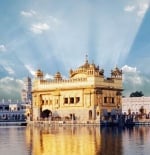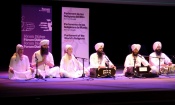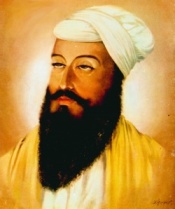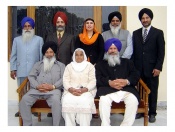Essence of Sikhism
| Part of a series on Sikhism |
|
|
Sikhism (Sikhi, ਸਿੱਖੀ in Panjabi) is one of the major world religions, primarily developed in 16th and 17th century India. "Sikhi" comes from the word "Sikh", and the word "Sikh" comes from the Sanskrit root "śiṣya" (शिषढ़य) which means "disciple" or "learner".
Guru Nanak was the founder of Sikhi. He was born in 1469 in the village of Nankana Sahib, near Lahore in present-day Pakistan previously part of a sub-continent known as Hindustan.
The Sikh faith system is based on the teachings of Guru Nanak and ten successive Sikh Gurus (the last one being the sacred text Guru Granth Sahib) and is the fifth-largest organized religion in the world. This system of religious philosophy and expression has been traditionally known as the Gurmat (literally the counsel of the gurus) or the Sikh Dharma.
Guru Granth Sahib (also called the Adi Granth) is more than just a scripture of the Sikhs, for the Sikhs treat this Granth (holy book) as their living Guru. The holy text spans 1430 pages and contains the actual words spoken by the founders of the Sikh religion (the Ten Gurus of Sikhism) and the words of various other Saints from other religions including Hinduism and Islam.
The Guru Granth Sahib was given the Guruship by the last of the living Sikh Masters, Guru Gobind Singh in 1708.
Background and First Impressions
This article is about the beliefs, principles and concepts of this faith system. Newcomers to this faith system have always been surprised by the modern ideas and practises expressed by the scriptures of this religion. In 1962, Miss Pearl S. Buck, a Nobel laureate was given an English translation of the Guru Granth Sahib. This is what she wrote about the incident:
"When I was in India in 1962, one of the notable events of my Visit was the presentation to me of the English version of Sri Guru-Granth Sahib, translated and annotated by Dr. Gopal Singh. I was deeply grateful to receive this great work, for in the original it was inaccessible to me, and this was a matter of regret, for I have had many Sikh friends, and have always admired their qualities of character. Now that I have had time in my quiet Pennsylvania home to read their scriptures slowly and thoughtfully, I can understand why I have found so much to admire. The religion of a people has a profound and subtle influence upon them as a whole, and this is true whether individuals do or do not profess to be religious."
Arnold Toynbee a British Historian when writing the Foreword in "The Sacred Writings of the Sikhs" by UNESCO wrote:
"Mankind’s religious future may be obscure; yet one thing can be foreseen. The living higher religions are going to influence each other more than ever before, in the days of increasing communications between all parts of the world and branches of human race. In this coming religious debate, the Sikh religion and its scriptures, the Guru Granth, will have something special of value to say to the rest of the world."
The Essence of this faith
There is only One God
- Main article: One God
and the Sri Guru Granth Sahib, the Sikh holy scripture
begins with the word:
which basically means - There is only One God.
The fundamental belief of Sikhism is that God exists, not merely as an idea or concept, but as a Real Entity, indescribable yet knowable and perceivable to anyone who is prepare to dedicate the time and energy to become perceptive to His persona. The Gurus never spoke about proofs of the existence of God: For them He is too real and obvious to need any logical proof.
Guru Arjan, Nanak V, says, "God is beyond colour and form, yet His presence is clearly visible" (SGGS 74), and again, "Nanak's Lord transcends the world as well as the scriptures of the east and the west, and yet he is clearly manifest" (SGGS 397).
In any case, knowledge of the ultimate Reality is not a matter for reason; it comes by revelation of Himself through "nadir" or grace and by "anubhava" or mystical experience. Says Guru Nanak, "budhi pathi na paiai bahu chaturaiai bhai milai mani bhane" which translates to "He is not accessible through intellect, or through mere scholarship or cleverness at argument; He is met, when He pleases, through devotion" (SGGS 436).
All Peoples of the World are Equal
- Main article: Equality of mankind
The Guru Granth Sahib promotes the message of equality of all beings. Discrimination of all types is strictly forbidden. Since Fatherhood of God was the basic Sikh tenet, sisterhood/brotherhood of humans ipso facto became its social corollary. No one was to be reckoned low or high –“Reckon the entire mankind as One” (Akal Ustat, 15.85) was the Guru Gobind Singh’s precept.
The Gurus went further than just proclaiming the equality of humans. They established dignity of labour, by making social service (seva) as an important vehicle of spiritual advancement. “The hands and feet that shun seva are condemnable; actions other than seva are fruitless” (Bhai Gurdas, Varan, XXVII. 10). Begging is taboo for the Sikhs. While bhaktas could live on alms and public charity, not so a Sikh. He is ordained to earn his living by the honest labour of his hands (kirat) and share his earnings with others. It rehearsed in the fifteenth century the ideology of fraternity, equality and liberty. The Gurbani below gives a general idea of the message put forward by the Gurus:
{{tuk1|446|20189|They look upon all with equality, and recognize the Supreme Soul, the Lord, pervading among all.
Women as Equals
- Main article: Sikh women
A drastic distinction between the roles of the male and female exists in all the history of modern human societies. Women have grown to accept, not without resentment though, the male-dominated atmosphere of the world. Because people use religious doctrine to define their life styles, religious views in both the East and the West seem to condone, even encourage, the unequal treatment of women. In the 15th century, Guru Nanak established Sikhism, the first religion to advocate emphatically the equality of all people, especially women.
In a continent characterized by severe degradation of women, this bold declaration, along with others, determined to erase the impurities of the Indian society. However, prejudices and injustices based on gender linger even today. (by Valerie Kaur) www.sikhwomen.com
| SGGS Page 473 Shabad 1748 Read text in English at the bottom of the screen |
| "From woman, man is born; within woman, man is conceived; to woman he is engaged and married.
Woman becomes his friend; through woman, the future generations come. When his woman dies, he seeks another woman; to woman he is bound. So why call her bad? From her, kings are born. From woman, woman is born; without woman, there would be no one at all. O Nanak, only the True Lord is without a woman. That mouth which praises the Lord continually is blessed and beautiful. O Nanak, those faces shall be radiant in the Court of the True Lord. (2)" |
Seva
- Main article: Seva
Seva also Sewa, short for the word Karseva refers to "selfless service", work or service performed without any thought of reward or personal benefit.
All Sikhs are encouraged by their Guru (Guru Granth Sahib) to perform Seva or Selfless Service. This is not only good for community relations but also is good for the moral uplifting of the person. You will find Sikhs engaged in free service in Gurdwaras washing dishes, cleaning the floors, serving food, etc.
Sikhs are also encouraged to help the community by performing unpaid work in hospitals, 'old peoples' homes, community centres, etc. Volunteers engaged in Seva are referred to as Sevadars and for many people this activity forms an essential part of their life, providing spiritual fulfilment and practical benefits.
Sikhism is founded on principles of Sarbat da bhalla - working towards the "common good of all". For Sikhs, this means reaching out to serve and uplift all of humanity as an expression or devotion to the Creator.
Many other Sikh institutes, such as Guru-ka-Langar, Kirtan, Paath, etc., depend on the performance of Seva by many in the congregation. So the principles of Seva underpin many Sikh values - such is the importance given to Seva in Sikhism.
This point is highlighted by the Guru in many places in the Guru Granth Sahib. The text explains the spiritual benefits of doing seva and the ways in which one should perform it, focussing on the state of the mind when performing seva.
Interfaith Harmony
- Main article: Interfaith
Sikhism is one religion, which is founded on the principles of global Interfaith communities and mutual Inter-community respect and harmony. The founders of Sikhism have since 1469 defined and preached the principles of interfaith respect, dialogue and harmony. A Sikh by definition must respect and accept all other world religions. Further, the Sikh must protect, guard and allow the free-practise of the customs and rituals of other religions.
The SGGS says on page 142:
| Without the Lord’s Name, life is worthless. Through doubt, the people are being destroyed. |
Khalsa is "God's army"
- Main article: Khalsa Kaal Purakh Ki Fauj
khhaalasaa kaal purakh ki fauj. pragattiou khhaalasaa pramaatham kee mauj.
Khalsa Kaal Purakh Ki Fauj is the Line of Saint-Soldiery, common among sikhs. These are words of Guru Gobind Singh. The purpose of the Khalsa as defined by the tenth Sikh Guru, Guru Gobind Singh who established the order of Sant Sipahi (Saintly warriors) was to act as "the army of God" to guard and protect everyone (not just Sikhs) and who always act according to their Gurus' teachings, rules and ethics were at act with charity, love and service to all human beings. The commandments of the Khalsa being enshrined in the Sri Guru Granth Sahib.
This brings unprecedented responsibilities and duties that need to be fulfilled by the Khalsa. If the Khalsa is truly Kaal Purakh's or Akal Purakh's fauj or "God's army" then the duties of the Khalsa is to serve the Almighty and the entire people of the world. This concept is all encompassing and cannot be used in a narrow sense to refer to the duties of the Khalsa to a small sect or elite group of men/women who share similar beliefs; the Khalsa must serve the wider world community as that is the goal set by the Gurus. If the Khalsa fails to serve this wider goal, it will be lacking in its duties to their Guru and will not fulfil the key requirement set out by the Sikh Gurus in Gurbani.
Guardian of human rights
- Main article: Guardian of human rights
In the 239 years of leadership provided by the living Sikh Gurus, many powerful lessons have been left for the Sikhs and for other people of the world to learn from. Beginning in 1469, with the birth of Sikhism's founder, Guru Nanak to the demise of the tenth and last living master of Sikhi, Guru Gobind Singh in 1708, the history of the Sikh Gurus is packed full of numerous events, incidents, occurrences, celebrations, confrontations, unions, and much more that gives, not only the Sikhs, but the citizens of the world, a clear and unique message and direction to the interested reader. These events in history are an example for the followers of the Gurus to learn from; to gain spiritual guidance and insight from, as each of us moulds our life to the path of dharma or righteousness.
The Sikh religion is somewhat unusual in the way that it was created; where most other of the world's religions have had a short span of birth of perhaps, no more than 40 to 70 years. Sikhi has taken a longer period in its creation phase. Ten human leaders nurtured Sikhi , as it evolved into a fully fledged world religion. Guru Nanak laid down the foundations of this faith and each subsequent Guru added to and reinforced the work done by his predecessors. In this way the light of Nanak was carried by 9 other souls until the Guruship was passed to the Guru Granth Sahib in 1708 by the last living, human Guru of the Sikhs - Guru Gobind Singh.
Recognize the human race as one

Guru Gobind Singh
- Main article: Recognize the human race as one
One of Guru Gobind Singh’s main gifts to the world was the message of unity and equality of all the peoples of the world. The Guru was responsible for the unity of the peoples of Punjab and the message of the universal brotherhood of the human race. The Hindus, Muslim, Sikhs and others felt that they were treated fairly and equally within the domain of the Guru. The Guru’s mission was centred on Anandpur Sahib, which became the main centre of development during the time of the tenth master.
Prior to the arrival of Guru Tegh Bahadur the hill country around what would become Anandpur was made up of kingdoms ruled predominately by Hindus, where the Brahmanic brand of caste distinction was rigidly observed. Fellow human beings within the same religion worked each in his own sphere of carefully delineated castes each with its own duties.
The Hindu kingdoms were often at war with one another and were subjugated to the Mughal rulers who were at every chance attempting to win converts to Islam, particularly from the lower castes who were not even allowed to enter the temples of the religion that they were a part of. By joining Islam they could rapidly rise to rule those who had called them untouchable only days before. Wars and skirmishes were a common occurrence. However, in the kingdom ruled by the Sikhs slowly and steadily this mood of agitation changed with the introduction of a recognition of the unity of man.
Importance of Family Life
- Main article: Guru Granth Sahib on family life
Guru Nanak stressed the importance of the "way of the householder" ("Gristi jivan")as the ideal pattern of life for the seeker of liberation, rejecting the ascetic alternative. He himself lead a family life, was married and went onto have a family who performed very well the tasks expected of them in society.
All his successors upheld the same ideal of normal family life, expressing it in their own lives as well as in their teachings. The third Guru, Amar Das (1479–1574) proclaimed: "Family life is superior to ascetic life in sectarian garb because it is from householders that ascetics meet their needs by begging" (AG, p. 586). To understand the family relationships, caste and gender issues need to be addressed from the Sikh perspective.
Accordingly, the Guru Granth Sahib provides support for the institute of family; the holy Granth advocates the performing of mutual duties and responsibilities in the family setting. One needs to stay "detached" yet distribute love, affection and hard labour to make the environment pleasant and endearing to the raising of children and the protection of parents and grand parents. The family unit is the basic unit of a Sikh society.
Sikhism and Ritualism
- Main article: Sikhism and Ritualism
The Sikh faith condemns empty rituals and superstitions. The practice of blind rituals, worshipping of idols and inanimate objects, participating in religious fasts, pilgrimage to holy places, offering of food to sadhus (religious leaders), believing in any other such rituals, superstitions or fads or other meaningless rituals will not bring one closer to God nor make one a better human being.
In all societies round the world, through fear and uncertainty, members undertake in ritualistic and worthless behaviour at times of worry, uncertainty or trouble. These poor people, wrongly believe that undertaking these empty customs and penances will bring them special assistance from Waheguru or some other higher power.
The reliance on these blind customs appears to increase at time of stress in human existence. For example, In 1989, Susan Starr Sered conducted fieldwork among women who has just had a baby on the maternity ward of a Jerusalem hospital. The women who she interviewed reported having performed close to two hundred different religious and secular rituals during pregnancy, birth, and the immediate post-partum period. So, it is clear that ritualism has not faded but may be on the increase.
Sikhi, a Lesson of Love
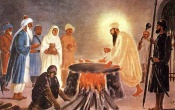
- Main article: Sikhi: a lesson of love
A Sikh is a person who accepts Gurbani (the Guru's words) as his or her spiritual guide and who adheres to the message contained within its holy pages. Sikhi is the message of the holy Granth and the code or policy (rehat) by which the person has to live their life. It is fascinating how the underlying message of the Sikh Holy Scripture is a message of pure love.
This love and longing is evident on all the pages of the Sikh scriptures; the Lord is referred to as "Husband Lord", "Beloved", "Immaculate", "Great", "Merciful", etc. all affectionate words for a tender, caring and powerful being.
However, God is not an external entity; God is said to be in all places; in every living things; literally everywhere. Gurbani tells us, "The Lord Himself is within the self, and outside as well...; the Lord Himself is fully pervading everywhere" and also "You are the Great Giver of all souls; You are the Life within all living beings."
The ten Sikh Gurus and the other bhagats of the Sikhs in their compositions in Gurbani, explain over and over again their dedication and their love for the Almighty Lord. Guru Ram Das, the fourth Sikh Guru explains his love for the Lord thus: "Without the Lord, I cannot live for a moment, even an instant; I love Him, like the camel loves the vine." (GGS 369).
If you wish to learn about love for the Lord, then its easy to learn it from the Sikh Gurus. The fourth Sikh master later in the holy Granth also says: "My inner being is filled with love for my Beloved Husband Lord. How can I live without Him?" (GGS 1113); elsewhere, the Sikh scripture inform us "O Nanak, the fish is in love with the water; if it pleases You, Lord, please enshrine such love for you within me.".
Sikhi against Cruelty
- Main article: Guru Granth Sahib against cruelty
What is cruelty? Cruelty is any act that causes distress, discomfort, pain and/or suffering to a living organism. It does not always involve violence although most people associate violence with acts of cruelty - this does not always follow. One can be cruel without using violence.
Any act of mercilessness, pitilessness and ruthlessness done without any feelings of kindness in ones heart; a feelings of extreme and complete heartlessness is termed cruel. Any act of harshness, brutality or barbarousness on any living being causing it to suffer tension, annoyance, discomfort, irritation and/or pain is termed cruel.
In Sikhi cruelty is not permitted; it is an aspect of human life that has been addressed very clearly by the Sikh Gurus. "Cruelty, material attachment, greed and anger are the four rivers of fire. Falling into them, one is burnt, O Nanak!" (SGGS p 147).
If anyone wants to follow the Sikh way, they must discard cruelty, material attachment, greed and anger otherwise they will end up getting burnt! What is the point of living a life where in the end you are thrown into the fire!
So don't be a Manmukh (ego-centric, self willed person) but follow the Guru's instruction and become Gurmukh; follow the well thought out instructions of the wise Guru! The Guru tells us, "The hearts of the self-willed manmukhs are hard and cruel; their inner beings are dark. Even if the poisonous snake is fed large amounts of milk, it will still yield only poison." (SGGS p 171)
Remove that "hardness" and "darkness" in your heart and become pure and pristine; discard the negative features in your personality and adopt a path of righteousness bringing peace to your life. Don't be like a snake which even when fed with pure life-giving milk (considered sacred by some cultures) still indiscriminately yield deadly life-destroying poison!
